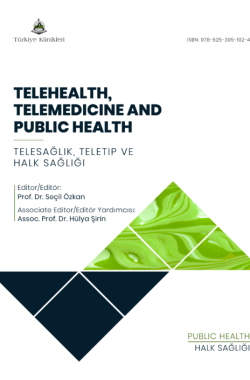Remote Healthcare Services Delivery by Health Information Technology Companies
Hakan Oğuz ARIa , Hüseyin ÇELİKb
aUniversity of Health Sciences Faculty of Gülhane Health Sciences, Department of Healthcare Management, Ankara, Türkiye
bRepublic of Türkiye Ministry of Health, Turkish Health Policies Institute, Ankara, Türkiye
Arı HO, Çelik H. Remote healthcare services delivery by health information technology companies. In: Özkan S, ed. Telehealth, Telemedicine and Public Health. 1st ed. Ankara: Türkiye Klinikleri; 2024. p.11-4.
ABSTRACT
Remote healthcare service delivery (RHSD) is a new model that all healthcare systems face, especially after the COVID-19 pandemic. Policymakers are implementing USHS to increase the effectiveness, efficiency, patients’ access to services and cost control. RHSD implementation in Türkiye started with the regulation issued in the first quarter of 2022. While health institutions authorized by the Ministry of Health can provide RHSD, this authorization has not been granted to the information technology (IT) companies that set up the infrastructure of this service. Increasing RHSD on a global scale have created a financing dimension. In this study, the current situation was analysed and recommendations were developed to the effect that granting this authority to IT companies operating in this field in Türkiye, provided that they fulfil the necessary conditions, would increase the share to be received from the global scale and that this window of opportunity could be used in favour of Türkiye.
Keywords: Delivery of healthcare; telemedicine; remote consultation
Kaynak Göster
Referanslar
- Strehle EM, Shabde N. One hundred years of telemedicine: does this new technology have a place in paediatrics? Arch Dis Child. 2006;91(12):956-9. [Crossref] [PubMed] [PMC]
- Sood SP, Negash S, Mbarika VW, Kifle M, Prakash N. Differences in public and private sector adoption of telemedicine: Indian case study for sectoral adoption. Stud Health Technol Inform. 2007;130:257-68.
- WHO. A health telematics policy in support of WHO's Health-For-All strategy for global health development: report of the WHO group consultation on health telematics, 11-16 December, Geneva, 1997. Geneva, World Health Organization, 1998.
- Fortney JC, Pyne JM, Edlund MJ, Williams DK, Robinson DE, Mittal D, et al. A randomized trial of telemedicine-based collaborative care for depression. J Gen Intern Med. 2007;22(8):1086-93. [Crossref] [PubMed] [PMC]
- Charles BL. Telemedicine can lower costs and improve access. Healthc Financ Manage. 2000;54(4):66-9.
- Chauhan V, Galwankar S, Arquilla B, Garg M, Somma SD, El-Menyar A, et al. Novel Coronavirus (COVID-19): Leveraging Telemedicine to Optimize Care While Minimizing Exposures and Viral Transmission. J Emerg Trauma Shock. 2020;13(1):20-24. [Crossref] [PubMed] [PMC]
- Uzaktan Sağlık Hizmetlerinin Sunumu Hakkında Yönetmelik. Resmi Gazete, 10 Şubat 2022. ©2021 [Access date: 08 November 2023]. Access link: [Link]
- Birinci Ş, Ülgü MM, Feyzioğlu SB, Sebik NB, Yarbay Y. Uzaktan Sağlık Hizmetlerinin Sunumu Hakkında Yönetmelik Kapsamında Türkiye'de Sağlık Hizmetleri: Bir Geleneksel Derleme Çalışması. Turkiye Klinikleri J Health Sci. 2023;8(3):514-22. [Crossref]
- Eysenbach G. What is e-health? J Med Internet Res. 2001;3(2):E20. [Crossref] [PubMed] [PMC]
- Mercer Marsh Benefits. MMB Health Trends: 2020 Insurer Survey, benefits that truly benefit: insurer perspective.
- Richardson E, Aissat D, Williams GA, Fahy N. Keeping what works: remote consultations during the COVID-19 pandemic. Eurohealth. 2020;26(2):73-6.
- EY Türkiye. Dijital Sağlıkta Dünya ve Türkiye Perspektifi. Mart 2023.
- T.C. Strateji ve Bütçe Başkanlığı. 2024 Yılı Cumhurbaşkanlığı Yıllık Programı. Ankara, 2023.
- T.C. Strateji ve Bütçe Başkanlığı. Orta Vadeli Program (2024-2026). Ankara, 2023.

